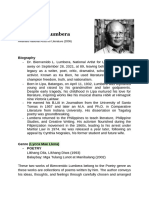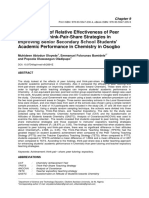Bienvenido Lumbera
Bienvenido Lumbera
Uploaded by
ronalddelarosa.lopez21Copyright:
Available Formats
Bienvenido Lumbera
Bienvenido Lumbera
Uploaded by
ronalddelarosa.lopez21Copyright
Available Formats
Share this document
Did you find this document useful?
Is this content inappropriate?
Copyright:
Available Formats
Bienvenido Lumbera
Bienvenido Lumbera
Uploaded by
ronalddelarosa.lopez21Copyright:
Available Formats
A writer’s truth: The legacy of National Artist Bienvenido Lumbera
A writer, poet, critic, dramatist, mentor, scholar, political prisoner, activist.
Dr. Bienvenido L. Lumbera, National Artist for Literature, was all this and more.
With his passing on September 28, 2021, at the age of 89, Dr. Lumbera—Ka Bien to his
friends and colleagues—left behind a distinguished body of works and a legacy of fearless activism,
harnessing the power of literature and the arts for the cause of freedom, truth, and nationalism.
A writer’s childhood
Dr. Lumbera’s literary work encompasses multiple genres, from poetry to stage plays and
librettos. His love for these different genres stems from his childhood. Born in Lipa, Batangas,
on April 11, 1932, to Timoteo and Carmen Lumbera. Young Bienvenido was orphaned at an
early age. He and his older sister Leticia were cared for initially by their paternal grandmother,
then when the war ended, by his godparents, Enrique and Amanda Lumbera.
Despite the tragedy he had experienced at such a young age, Lumbera recalled having a rich childhood. He played with
the neighboring kids, played the action movies he watched and listened to his aunts read aloud from the novella series
in Liwayway magazine. His childhood experiences in the historic town of Lipa formed the foundation of his writing career.
One of his renowned musical dramas, Hibik at Himagsik nina Victoria Laktaw, is set in his childhood town.
Lumbera went to Lipa Elementary School and finished high school at Mabini Academy. Initially, he wanted to attend
college at the University of the Philippines. However, his guardians, who supported his education, convinced him to enroll
at the University of Santo Tomas instead. It was closer to their place of work. In 1957, he earned his B.Litt in Journalism
from UST. In 1967, he obtained his M.A. and Ph.D. in Comparative Literature from Indiana University. His
groundbreaking dissertation focused on Tagalog poetry from the seventeenth to the nineteenth centuries. While studying
in the U.S., he threw himself entirely into education in culture—film, theater, opera, jazz, and everything in between.
After coming home from the U.S., Lumbera taught Literature, Philippine Studies, and Creative Writing at the Ateneo de
Manila University. This period saw his activist spirit ignite. He was involved in the Filipinization movement in the 1960s,
and served as the chairman of the Panulat Para sa Kaunlaran ng Sambayanan (PAKSA), an organization of activist-
writers. His activism was so well-known that when Ferdinand Marcos declared Martial Law in 1972, Lumbera knew he was
among those targeted for arrest and was forced underground. He was arrested in January 1974, and released a year later
after Cynthia Nograles, his former student at Ateneo de Manila University, appealed for his release. The two were married
a few months later.
A nationalist writer in the time of Martial Law and beyond
In an interview with Rappler published on April 12, 2017, Lumbera shared an experience he had following his release
from prison during Martial Law. He described how department stores hired people to dress up and pose in shop windows
as living mannequins.
“So nandoon naka-display sila. Alam mong buhay ang mga tao na ito, pero hindi sila nakikipag-usap, hindi sila
gumagalaw. Ang laki ng epekto noon sa akin. Naiyak ako,” Lumbera revealed. “Ang mga tao na ito ay mga tunay na tao,
pero nagpapanggap na hindi tao. Parang ganon ang sitwasyon sa panahon ng Martial Law—na kailangan ng mga tao na
magpanggap na iba sila sa tunay na pagkatao nila [So there they are on display. You know they’re alive, but they don’t
speak, they don’t move. This had a profound effect on me. I wept. These are real people pretending not to be. This was
how it was like during the time of Martial Law—people having to pretend that they are not who they are].”
Photo from UP AVP Jose Wendell Capili.
For Lumbera, this experience and imprisonment only cemented his commitment as a truth-teller and nationalist writer. In
1976, through Professor Petronilo Bn Daroy, Lumbera began teaching at the Department of Filipino and Philippine
Literature, UP College of Arts and Sciences (CAS). A year later, UP CAS Dean Francisco Nemenzo appointed him to
become editor of the Diliman Review, which was critical of the Marcos dictatorship.
Lumbera began writing librettos for musical theater, starting with the Philippine Educational Theater Association’s (PETA)
request to create a musical based on Carlos Bulosan’s America Is in the Heart. Eventually, Lumbera wrote several highly
acclaimed musical dramas such as Tales of the Manuvu, Rama: Hari, Nasa Puso ang Amerika, Bayani, and Noli me
Tangere: The Musical. He counts his adaptation of Dr. Jose Rizal’s novel, Rama Hari and Hibik at Himagsik nina Viktoria
Laktaw, a tribute to Filipino revolutionary women during the revolution of 1896, as his most successful plays. In 2004, De
La Salle University-Manila Press published Sa Sariling Bayan: Apat na Dulang May Musika , an anthology of Lumbera’s
musical dramas.
Lumbera authored numerous books on literary criticism, textbooks, and anthologies such as Revaluation: Essays on
Literature, Cinema, and Popular Culture; Pedagogy; Philippine Literature: A History and Anthology; Rediscovery: Essays in
Philippine Life and Culture; Filipinos Writing: Philippine Literature from the Regions ; and Paano Magbasa ng Panitikang
Filipino: Mga Babasahing Pangkolehiyo. He once admitted he preferred writing poetry rather than short stories because
he disliked using a typewriter for more extended periods. Most of his poems are collected in Likhang Dila, Likhang Diwa,
published in 1994. These include “Ka Bel”; “The Yaya’s Lullaby,” “Servant,” “Sadness,” “Jamborzkie Light,” and the
frequently anthologized “Eulogy of Roaches.”
Bayan at Lipunan: Ang Kritisismo ni Bienvenido Lumbera , edited by UP Professor Emerita Rosario Torres-Yu, was
published and launched by the UST Publishing House, and celebrated by UP in January 2006.
Aside from UP, Lumbera also taught Literature, Philippine Studies, and Creative Writing in the Ateneo de Manila
University, De La Salle University and his alma mater, the University of Santo Tomas. He also served as Visiting Professor
of Philippine Studies at Osaka University from 1985 to 1988. He is also the first Asian Scholar-in-Residence at the
University of Hawai’i at Manoa.
He mentored generations of outstanding Filipino artists, writers and scholars, including the highly-acclaimed critic Doreen
Gamboa Fernandez, UP Professors Emeriti Teresita Gimenez Maceda, and Nicanor G. Tiongson, Ateneo de Manila
University Professor Emerita Soledad S. Reyes, De La Salle University Professor Emeritus Isagani R. Cruz, University of
California at Berkeley faculty member Joi Barrios-Le Blanc, University of Hawai’i at Manoa Indo-Pacific Languages and
Literatures Department Chair and Center for Philippine Studies Director Pia C. Arboleda, and National Artist for Literature
and UP Professor Emeritus Virgilio S. Almario. He taught undergraduate students who became distinguished academics,
such as UP Professors Glecy Cruz Atienza, Galileo S. Zafra, and Alwin C Aguirre. He also taught film directors Sari Dalena
and Joel Lamangan, and screenwriter Ricky Lee.
Legacy of a writer, dramatist, and activist
In the end, Lumbera lived true to his belief that writers should immerse with the masses and help to improve society. He
remained actively involved in progressive organizations fighting for social justice and true equality, from the Philippine
Comparative Literature Association in 1969 to the Pamana ng Panitikan ng Pilipinas in 1970, to the progressive poets’
group Galian sa Arte at Tula (GAT) during Martial Law. Other writers’ organizations he helped lead include the Kalipunan
para sa mga Literatura ng Pilipinas, the Philippine Studies Association of the Philippines, and Manunuri ng Pelikulang
Pilipino.
Lumbera is also the founding chairperson of the Board of Trustees of the multi-awarded media group Kodao Productions.
He was an active member of the Concerned Artists of the Philippines (CAP) and the Bagong Alyansang Makabayan
(Bayan). He also served as president of the Alliance of Concerned Teachers (ACT), a national organization of more than
40,000 teachers and employees in the education sector.
He earned numerous awards and accolades throughout the years, including the Ramon Magsaysay Award for Journalism,
Literature, and Creative Communication Arts, the Pambansang Gawad Pambansang Alagad ni Balagtas from Unyon ng
mga Manunulat ng Pilipinas (UMPIL), the National Book Awards for Literary History/Literary Criticism from the Manila
Critics’ Circle, the Carlos Palanca Memorial Award for Literature, the Philippine Centennial Literary Prize for Drama, and
the Cultural Center of the Philippines Centennial Honors for the Arts. He became Professor Emeritus of the University of
the Philippines and, in 2006, was named National Artist for Literature.
Dr. Lumbera’s legacy lies not just in his immense body of works and in the generations of writers and artists he taught.
Most importantly, he is noted for his abiding commitment to nationalist writing and to his belief that a writer must, above
all, write the truth of their experiences.
You might also like
- 2024 CAT PAT Grade 10 Learner GuideDocument37 pages2024 CAT PAT Grade 10 Learner Guidelwandlemaduna693100% (2)
- Grade 8 English 3rd Quarter Lesson PlanDocument2 pagesGrade 8 English 3rd Quarter Lesson PlanMae Ann Miralles Piorque89% (44)
- 21st Century Philippine Literature From The RegionsDocument4 pages21st Century Philippine Literature From The RegionsRiona Copiling100% (3)
- Statement of PurposeDocument2 pagesStatement of PurposeUyen CaoNo ratings yet
- Craft Personal Entrepreneurial Strategy PDFDocument66 pagesCraft Personal Entrepreneurial Strategy PDFShane Brown83% (6)
- Leadership Management and Co-OrdinationDocument25 pagesLeadership Management and Co-Ordinationpatrick kyanda100% (1)
- Contemporary Phil. Arts From The RegionDocument13 pagesContemporary Phil. Arts From The RegionmyrnaNo ratings yet
- Phillipine TheaterDocument17 pagesPhillipine Theateranthonyarmamento27No ratings yet
- Bienvenido Lumbera - Wikipedia PDFDocument17 pagesBienvenido Lumbera - Wikipedia PDFEvangeline Baisac100% (1)
- Canonical and National ArtistsDocument9 pagesCanonical and National ArtistsAce Catherine100% (4)
- Bienvenido LumberaDocument2 pagesBienvenido LumberaJustine AsidoNo ratings yet
- Pillars of LiteratureDocument39 pagesPillars of LiteratureRoxanne Maghinang Delos ReyesNo ratings yet
- National Artists For LiteratureDocument8 pagesNational Artists For LiteratureCherry Ann Mandaquit100% (1)
- LITPHILHIS Profiles2Document17 pagesLITPHILHIS Profiles2Teina HakutoNo ratings yet
- Bienvenido LDocument10 pagesBienvenido LLester Khylle PeritoNo ratings yet
- 21stcanonicalauthors 210103043329Document53 pages21stcanonicalauthors 210103043329Gwen LopezNo ratings yet
- Canonical and National Artist For LiteratureDocument37 pagesCanonical and National Artist For LiteratureSicnarf OtiksomNo ratings yet
- National ArtistDocument9 pagesNational ArtistHazel Kaye EspelitaNo ratings yet
- National Artist AwardeesDocument141 pagesNational Artist AwardeesAngel Duday LagarniaNo ratings yet
- Bienvenido LumberaDocument13 pagesBienvenido Lumberakyla may ramirez100% (1)
- Canonical Authors 21st NavbDocument26 pagesCanonical Authors 21st NavbLyka Mae NavarroNo ratings yet
- Region Ii AuthorsDocument5 pagesRegion Ii Authorsカタピア キト・ルイス0% (1)
- DocumentDocument3 pagesDocumentJestoni De JesusNo ratings yet
- Region Ii AuthorsDocument3 pagesRegion Ii AuthorsAnnabelle ApostolNo ratings yet
- Canonical Authors and Works of Philippine National Artists in LiteratureDocument19 pagesCanonical Authors and Works of Philippine National Artists in LiteratureCris Gacuan0% (1)
- National Artist For LiteratureDocument52 pagesNational Artist For LiteratureDimphna Jel Pacifico100% (1)
- National ArtistDocument14 pagesNational ArtistJohn JonasNo ratings yet
- BiographyDocument13 pagesBiographyDavid FerrerNo ratings yet
- Quarter 1 Lesson 1Document7 pagesQuarter 1 Lesson 1ConnieRoseRamosNo ratings yet
- In Literature: Philippine National ArtistsDocument51 pagesIn Literature: Philippine National ArtistsLady AnnENo ratings yet
- San Francisco, Ocampo, Camarines Sur: Genesis Children'S Growth Academy, CorpDocument4 pagesSan Francisco, Ocampo, Camarines Sur: Genesis Children'S Growth Academy, Corpcarl austria100% (1)
- Prepared by Miss Mary Katrine M. BelinoDocument51 pagesPrepared by Miss Mary Katrine M. BelinoChristian Mark Almagro AyalaNo ratings yet
- Jose Garcia VillaDocument10 pagesJose Garcia VillaronalynNo ratings yet
- Prepared by Miss Mary Katrine M. BelinoDocument51 pagesPrepared by Miss Mary Katrine M. BelinoMeizen Delos ReyesNo ratings yet
- Lesson 2Document21 pagesLesson 2Gil Vhal Molato MangantulaoNo ratings yet
- Philippines' Canonical National Artists in Literature Edith TiempoDocument2 pagesPhilippines' Canonical National Artists in Literature Edith Tiempoariel a. ortizNo ratings yet
- Canonical Authors and Works of Philippine National ArtistsDocument36 pagesCanonical Authors and Works of Philippine National ArtistsJoyce Rodanillo Lovenario80% (5)
- Bienvenido Lumbera NotesDocument7 pagesBienvenido Lumbera Notesm.pangandagNo ratings yet
- Canonical Authors and Works of The Philippine National Artists in LiteratureDocument5 pagesCanonical Authors and Works of The Philippine National Artists in LiteratureJessica CaisipNo ratings yet
- Linde SauthorDocument9 pagesLinde SauthorKat IbañezNo ratings yet
- Canonical Philippine National Artists in LiteratureDocument16 pagesCanonical Philippine National Artists in LiteratureneilaaronsalgadoNo ratings yet
- ExhibitionDocument9 pagesExhibitionristhyjeanNo ratings yet
- Phil. Canonical AuthorsDocument29 pagesPhil. Canonical AuthorsCharlotte Olsen100% (1)
- 21ST Cent Topics1Document6 pages21ST Cent Topics1amerahsndbmustapha28No ratings yet
- Canonical Authors and Works of Philippine National Artists in LiteratureDocument13 pagesCanonical Authors and Works of Philippine National Artists in LiteratureJubie Lingbawan AlbaniaNo ratings yet
- Francisco "Franz" Arcellana: PrayerDocument12 pagesFrancisco "Franz" Arcellana: PrayersmithmiNo ratings yet
- Video Report in El101Document14 pagesVideo Report in El101Ukulele PrincessNo ratings yet
- LITERATUREDocument11 pagesLITERATUREAbegail Masayda100% (1)
- Kirt 3Document10 pagesKirt 3Luke TalledoNo ratings yet
- Spanish Era: 1. Rogilio OrdonezDocument6 pagesSpanish Era: 1. Rogilio OrdonezLara NovenoNo ratings yet
- Canonical Philippine National Artists in Literature: Prepared by Miss Mary Katrine M. BelinoDocument51 pagesCanonical Philippine National Artists in Literature: Prepared by Miss Mary Katrine M. BelinobinuaangelicaNo ratings yet
- National Artist of The PhilippinesDocument18 pagesNational Artist of The PhilippinesedilbertNo ratings yet
- Filipino WritersDocument18 pagesFilipino WritersEzra Dave IgnacioNo ratings yet
- LIT AUTHORS (2nd Sem Lit 101)Document23 pagesLIT AUTHORS (2nd Sem Lit 101)Mary Grace Manaeg HerederoNo ratings yet
- National Artists Hand OutDocument10 pagesNational Artists Hand OutVita BonumNo ratings yet
- Bienvenido Lumbera Filipino Poet and Critic Born April 11 1932 Died Septe 20241022 191757 0000Document12 pagesBienvenido Lumbera Filipino Poet and Critic Born April 11 1932 Died Septe 20241022 191757 0000espinozajenneliNo ratings yet
- 21 Century Literary Writers in The PhilippinesDocument6 pages21 Century Literary Writers in The PhilippinesJein P100% (2)
- Video Report in El109Document12 pagesVideo Report in El109Ukulele PrincessNo ratings yet
- Ayos Lang Ang Buhay Sa MaynilaDocument10 pagesAyos Lang Ang Buhay Sa MaynilaGillian Faye LechocoNo ratings yet
- ACTIVITYDocument11 pagesACTIVITYebanosarhumphreyNo ratings yet
- Lesson 1 Philippine Literature History National WritersDocument34 pagesLesson 1 Philippine Literature History National WritersPauleen San JuanNo ratings yet
- Canonical AuthorsDocument6 pagesCanonical AuthorsFloraine CanapiNo ratings yet
- Writers and Their Milieu: An Oral History of Second Generation Writers in English, Part 2From EverandWriters and Their Milieu: An Oral History of Second Generation Writers in English, Part 2Rating: 2 out of 5 stars2/5 (1)
- Making Something Happen: American Political Poetry between the World WarsFrom EverandMaking Something Happen: American Political Poetry between the World WarsNo ratings yet
- Experimental Writing: Africa vs Latin America Vol 1From EverandExperimental Writing: Africa vs Latin America Vol 1No ratings yet
- Act 1Document2 pagesAct 1ronalddelarosa.lopez21No ratings yet
- Rolando TolentinoDocument1 pageRolando Tolentinoronalddelarosa.lopez21No ratings yet
- PE 4 Recreational Games (GOLFSPORTS)Document16 pagesPE 4 Recreational Games (GOLFSPORTS)ronalddelarosa.lopez21No ratings yet
- Creating EportfolioDocument20 pagesCreating Eportfolioronalddelarosa.lopez21No ratings yet
- Island Project Create Your Own Economy - Cte Intro To Business - Kevin EasonDocument13 pagesIsland Project Create Your Own Economy - Cte Intro To Business - Kevin Easonapi-721420710No ratings yet
- Foundation - Prospectus 2021 - Pune - Without - FeeDocument32 pagesFoundation - Prospectus 2021 - Pune - Without - FeeNikNo ratings yet
- 1123 Example Candidate Responses Paper 1 For Examination From 2018Document28 pages1123 Example Candidate Responses Paper 1 For Examination From 2018Ali AhmedNo ratings yet
- Tonetti Et Al-2015-Journal of Clinical PeriodontologyDocument7 pagesTonetti Et Al-2015-Journal of Clinical PeriodontologyDiana IorgulescuNo ratings yet
- Customer Service in Banking: By: Doris ReinsDocument35 pagesCustomer Service in Banking: By: Doris ReinsmadhurendrahraNo ratings yet
- SWOT Analysis: Strength WeaknessDocument3 pagesSWOT Analysis: Strength WeaknessmillywanillyNo ratings yet
- Teaching Strategies in Mathematics: RepetitionDocument2 pagesTeaching Strategies in Mathematics: RepetitionIris Marie Vicente MaestreNo ratings yet
- MBBS Session 2017 18Document90 pagesMBBS Session 2017 18muhammad AliNo ratings yet
- P3 Syllabus, Lesson Plan, Term 1Document29 pagesP3 Syllabus, Lesson Plan, Term 1Precious BudengNo ratings yet
- Bamidele 2021 BP 2891EDocument13 pagesBamidele 2021 BP 2891EMuhideen Abiodun OloyedeNo ratings yet
- 4.53 FYBA RussianDocument7 pages4.53 FYBA Russiansalim bay1982No ratings yet
- Lesson Plan MatatagDocument6 pagesLesson Plan Matatagmaris10agaro100% (2)
- Learning Module Week 8Document18 pagesLearning Module Week 8Ereca OpallaNo ratings yet
- Comprehensive Guidance PlanDocument4 pagesComprehensive Guidance Planapi-374283780No ratings yet
- Editted Constitutional and Judicial Safeguards For Minority Rights in India-2Document141 pagesEditted Constitutional and Judicial Safeguards For Minority Rights in India-2Roll no 28 Trupti KudtudkarNo ratings yet
- Analisis SPM 2019Document15 pagesAnalisis SPM 2019Micro Yes MitokondriaNo ratings yet
- Nutritionist Course WorkDocument7 pagesNutritionist Course Workbd9gjpsn100% (2)
- Lesson: Manipulative and MultimediaDocument3 pagesLesson: Manipulative and MultimediaMaria Bettina Dizon100% (1)
- English Essay On Women EmpowermentDocument10 pagesEnglish Essay On Women Empowermentur mum gay100% (1)
- SwahiliDocument318 pagesSwahiliPendi Kurniawan100% (2)
- Gateway-B1 SB Unit7Document28 pagesGateway-B1 SB Unit7anisalera1507No ratings yet
- Advert-Tanzania Postal Bank-Bank Operation Oficers - 2 Vacancies - Arusha BranchDocument3 pagesAdvert-Tanzania Postal Bank-Bank Operation Oficers - 2 Vacancies - Arusha BranchRashid BumarwaNo ratings yet
- Course Outline CEM BBA 5 Fall 2022 01112022 012647amDocument7 pagesCourse Outline CEM BBA 5 Fall 2022 01112022 012647amsikander jalalNo ratings yet
- Community PharmacyDocument90 pagesCommunity Pharmacyadili soohaaNo ratings yet
- Oum Sem 2 English 1303Document15 pagesOum Sem 2 English 1303Kim Yeng LeongNo ratings yet





























































































